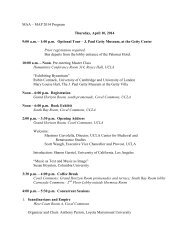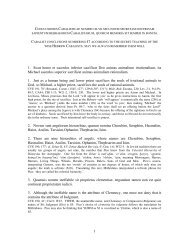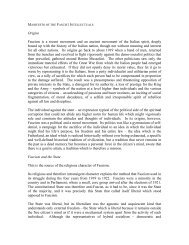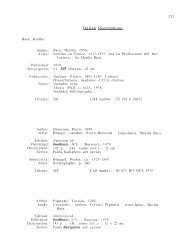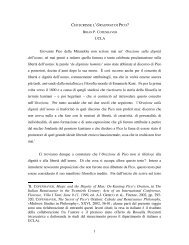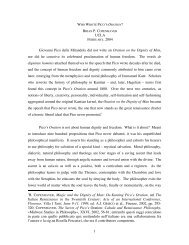1 (1) Pythagoras of Samos instructed the region of Italy once called ...
1 (1) Pythagoras of Samos instructed the region of Italy once called ...
1 (1) Pythagoras of Samos instructed the region of Italy once called ...
You also want an ePaper? Increase the reach of your titles
YUMPU automatically turns print PDFs into web optimized ePapers that Google loves.
judged ‘by a fair and good [standard].’ 75 ‘Fair’ itself is also <strong>the</strong> same as ‘fairness,’ and<br />
‘upright’ is <strong>the</strong> same as ‘uprightness,’ as when ‘<strong>the</strong>re are a number <strong>of</strong> aspects <strong>of</strong> an<br />
upright [character]’ and ‘<strong>the</strong>re are a number <strong>of</strong> aspects <strong>of</strong> uprightness.’<br />
(18) ‘Eternal’ is <strong>the</strong> same as ‘eternity,’ and <strong>the</strong>re are many examples, as in ‘<strong>the</strong> works <strong>of</strong><br />
many people last into eternal [time]’ and ‘works are written by many people for eternity.’<br />
‘Evil’ is <strong>the</strong> same as ‘wickedness’ (as I have said) or ‘depravity,’ ‘useful’ <strong>the</strong> same as<br />
‘utility,’ ‘suitable’ as ‘suitability,’ ‘proper’ as ‘property,’ ‘contrary’ as ‘contrariety’ and<br />
so on. 76<br />
Hence, <strong>the</strong> notion <strong>of</strong> concrete terms is nei<strong>the</strong>r general nor random, but it is nearly empty<br />
and groundless. 77 (19) I would ra<strong>the</strong>r <strong>the</strong>y had put <strong>the</strong>se terms in <strong>the</strong> masculine and<br />
feminine genders than in <strong>the</strong> neuter. For adjectives are substantivated in <strong>the</strong> masculine<br />
gender and <strong>the</strong> feminine, and <strong>the</strong>y signify a thing with <strong>the</strong> quality, but <strong>the</strong> things<br />
<strong>the</strong>mselves are only a man and a woman, as in ‘<strong>the</strong> swarthy is hotter by nature than <strong>the</strong><br />
fair,’ ‘<strong>the</strong> light is more beautiful by nature than <strong>the</strong> swarthy and <strong>the</strong> dark,’ ‘many are <strong>the</strong><br />
ill,’ and ‘rare are <strong>the</strong> chaste.’ You have such thoughts about no animal o<strong>the</strong>r than <strong>the</strong><br />
human and indeed about no o<strong>the</strong>r thing. ‘The angry [one] has no plan,’ ‘<strong>the</strong> greedy [one]<br />
does nothing right except at death,’ ‘<strong>the</strong> [one who is] submissive to <strong>the</strong> husband is hardly<br />
ever beaten’: <strong>the</strong> reference is not to a lion, dog, eagle or dove but to a man and a woman.<br />
(20) Likewise with ‘some,’ ‘a certain,’ ‘a particular,’ ‘anyone who,’ ‘ano<strong>the</strong>r,’ ‘none,’<br />
‘this,’ and ‘that’ [in <strong>the</strong> masculine and feminine], so that it makes no difference whe<strong>the</strong>r<br />
or not one adds ‘man’ or ‘woman’: ‘no man is here,’ ‘no woman is silent’; ‘none is here,’<br />
‘none is silent’ or ‘no one is here,’ ‘no one is silent.’ 78 But whoever said ‘nothing is<br />
silent’? Whe<strong>the</strong>r simple or composite, this term has no neuter substantive like those<br />
mentioned above – ‘something,’ ‘a certain thing,’ and ‘anything.’<br />
(21) This also holds for <strong>the</strong> general interrogative word, ‘who’ or ‘which,’ as in ‘who is<br />
present?’ and ‘which is dead?’ where it is certainly a man and a woman. Those Greeks<br />
whom Priscian followed were wrong, <strong>the</strong>refore, in leading to him to say ‘Who invented<br />
letters? A man. Who is useful for <strong>the</strong> plow? An ox. Who swims in <strong>the</strong> sea? A fish.’ 79<br />
For when one asks ‘Who invented writing?’ it is exactly <strong>the</strong> same as asking ‘Which<br />
person?’ How clumsy it would be if your answer were ‘a dog’ when I asked ‘who is<br />
waiting for me?’ If a dog and not a person were waiting, <strong>the</strong> answer should have been<br />
‘no one is waiting for you, just a dog.’<br />
(22) It is clear that I was asking about a person, in fact, since o<strong>the</strong>rwise I would not have<br />
said ‘who’ but ‘what is waiting for me?’ as in o<strong>the</strong>r cases. For one should not ask ‘who is<br />
useful for <strong>the</strong> plow?’ and ‘who swims in <strong>the</strong> sea?’ but ‘what?’. If someone were to ask<br />
75<br />
Cic. Rhet. Her. 2.20; Caec. 65; Dig. 17.1.12.9, 40.4.22.pr.; Ter. Adelph. 987.<br />
76<br />
Above, 2.24.<br />
77<br />
Above, 3.3.<br />
78<br />
Since <strong>the</strong>se words are gendered in Latin, it is not necessary, for example, to add mulier (‘woman’) to<br />
distinguish a feminine ‘that’ (illa) from a masculine (ille) or a neuter (illud).<br />
79<br />
Zippel cites Priscian, Gramm. 17.6.43<br />
20<br />
2/21/05 9:35 PM 20/44



